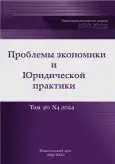The Use of Artificial Intelligence in Entrepreneurial Activities: Analysis of Legal Aspects and Prospects for Innovation in Russia and Abroad
- Authors: Khaddour Z.A.1
-
Affiliations:
- Financial University under the Government of the Russian Federation
- Issue: Vol 20, No 4 (2024)
- Pages: 89-94
- Section: Private Law (Civil) Sciences
- URL: https://journals.eco-vector.com/2541-8025/article/view/684442
- EDN: https://elibrary.ru/WSXUYP
- ID: 684442
Cite item
Abstract
The article, discusses the use of artificial intelligence in entrepreneurial activities and the prospects for innovation in this area in Russia and the abroad. The existing international and Russian legislative initiatives and practices aimed at regulating the use of AI are considered, as well as their impact on business development. The article emphasizes the need for an integrated approach to improving the legal regulation of artificial intelligence and proposes that the improvement of legal mechanisms should be based on the principles of ethics, security and data protection. In the article, the author came to the following conclusions:
- It is necessary to take advantage of the existing regulations on artificial intelligence in the EU, China and other countries, study them and take from them what is suitable for the Russian market, which will reflect on improving the use of artificial intelligence technologies in business and the economy as a whole.
- It is required to develop programs and strategies to increase public awareness of the risks and opportunities of AI, and to train specialists in information security and cyber defense.
- Research and development aimed at solving fundamental and applied problems in the field of AI should be supported.
- Companies working in areas related to artificial intelligence and releasing products using artificial intelligence technologies need to have a well-thought-out and effective AI development strategy, this can help companies optimize their data privacy operations while providing access to international markets.
- Regulatory initiatives should be adopted to ensure the safe and ethical use of AI, as well as to create a framework for innovation in this area, taking into account the potential risks and challenges associated with the development and application of new technologies.
Full Text
About the authors
Zein Alabdin Khaddour
Financial University under the Government of the Russian Federation
Author for correspondence.
Email: ZKhaddur@fa.ru
SPIN-code: 8242-2657
Teacher, Department Of legal regulation of economic activity, Faculty of law
Russian Federation, MoscowReferences
- EU Artificial Intelligence Law, February 2024.
- «Constitution of the Russian Federation» (adopted by popular vote on 12/12/1993 with amendments approved during the all-Russian vote on 07/01/2020).
- The National Strategy for the Development of AI for the period until 2030 was approved by Decree of the President of the Russian Federation of October 10, 2019 No. 490.
- US National AI Initiave (NAII) Act of 2020 (Division E, SEC. 5001) became law January 1, 2021.
- Zhurkov A.A. Ethical aspects of the use of artificial intelligence systems: international legal experience / Bulletin of the O. E. Kutafin University // Higher Attestation Commission. —2022.
- Khaddour Z.A. Legal Regulation of the Use of Artificial Intelligence Technologies in International Private Law: Challenges and Solutions // Gaps in Russian Legislation —2023.
- Serobyan G.A. Legal regulation of artificial intelligence systems: for or against / Law and state: theory and practice // Higher Attestation Commission. —2019.
- Mikhailov A.V. Prospects for the development of legislation on entrepreneurial activity in the digital economy // Supplement to the journal «Business Law». —2023. —No. 3. —P. 23.
- Kelepova M.E., Molodchik A.V., Nagornaya M.S. Legal and institutional regulation of artificial intelligence at the international and national levels / Management in modern systems // Higher Attestation Commission. —2022.
- Rolinson P., Arievich E. A., Ermolina D. E. Objects of intellectual property created with the help of artificial intelligence: features of the legal regime in Russia and abroad // Law. —2022. —No. 5. —P. 63–71.
- Chen B. (2023) Rule of law basis for the credible development of generative artificial intelligence. Shang hai zheng fa xue yuan xue bao=Bulletin of Shanghai Institute of Politics and Law, No. 4, pp.13–27 (in Chinese).
Supplementary files








